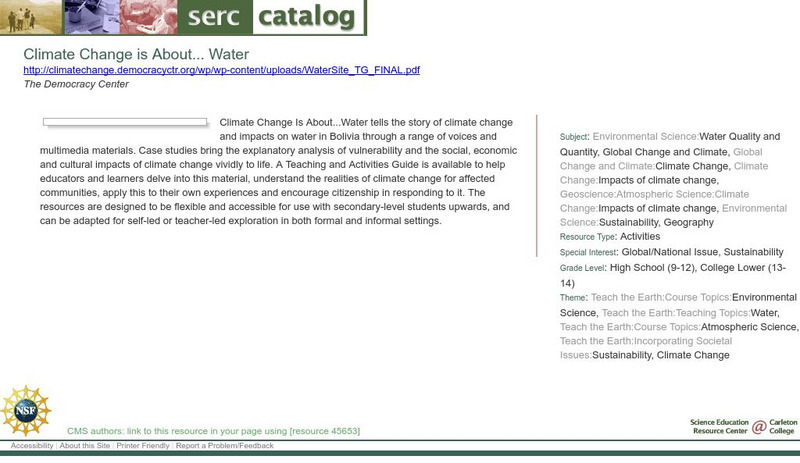Hi, what do you want to do?
Curated OER
A Childhood View of the Great Depression in Arkansas
Eighth graders identify the causes for the Great Depression of 1929 and see the effects of the depression, the Great Flood, and the drought in Arkansas through the eyes of a child.
Curated OER
What a Disaster!
High schoolers identify the causes of major natural disasters in a written response and on a poster. They explain with a written response, on a poster and to peers in an oral presentation, how people adapt to living in an environment...
Curated OER
Ocean Color
Students examine NASA's SeaWiFS Project Web site to explore how the SeaWiFS Project monitors environmental and climatic changes in the oceans and atmosphere. They answer questions and write a summary in support of continued funding for...
Curated OER
Is it Partly Cloudy or Partly Sunny?
Students investigate the concept of weather and how it is created. They review relevant vocabulary related to weather. Students predict weather given slight background knowledge. The lesson includes background information for the...
Curated OER
Habitat Is Home
Students are introduced to the concept and components of a habitat. They discuss the key components of a habitat and describe how certain factors can cause disturbances in a habitat and change its population. Activities are leveled for...
Curated OER
How are People Changing the Climate: Basics
For this climate change worksheet, students answer a series of questions about climate change. Students have multiple choice options for six online quiz questions
Curated OER
Tracking El Nino Conditions
Young scholars identify major changes in ocean temperatures during an El Nino season. In this climate lesson students complete an Internet assignment using datasets to determine periods of El Nino.
Curated OER
Picnic Possibilities
Fourth graders plan a picnic using weather data. Using accumulated weather data from various sources, they create a graph of the weather conditions in their region for a given period of time. Students interpret this data to predict the...
Curated OER
Wet World in Danger
Students investigate the reasons why wetlands are threatened especially by people. They study the wise use of water to preserve wetlands.
Curated OER
Climate Survival
Students use information about different world climate regions to plan how to survive in a particular climate zone for one year. They present their survival plans.
Curated OER
Water: to the Last Drop
Students research how water played an important role in US history. In this social studies activity, students make a mock newscast from one of the events they researched. They present their newscast to the class.
PBS
Pbs Learning Media: North American Monsoon
NASA tracked rainfall and soil moisture for a three-month period in 1993 to confirm that these rain patterns were indeed a monsoon. Watch this animation to see the relationship between soil moisture and rainfall in the Southwest U.S. By...
Science Education Resource Center at Carleton College
Serc: Rain Erosion: Does the Rate of Water Effect Erosion?
In this lab, students investigate whether the rate of water falling (rain) affects the amount of erosion (soil movement). This experiment could lead to further questions: how does grass or rocks effect soil erosion, does erosion lead to...
Science Education Resource Center at Carleton College
Serc: Climate Change Is About Water
Through a range of voices and multimedia materials, discover the story of climate change and its impacts on water in Bolivia. Case studies bring the explanatory analysis of vulnerability and the social, economic and cultural impacts of...
Alabama Learning Exchange
Alex: Exploring Weather Disasters
During this lesson, students will discover the differences in four types of weather disasters. They will collect information from selected Internet websites and create a multimedia presentation to demonstrate what they have learned.




















